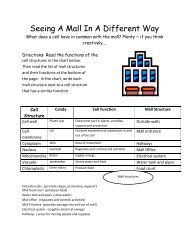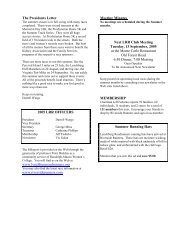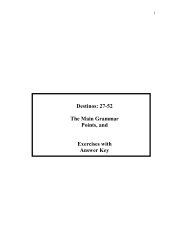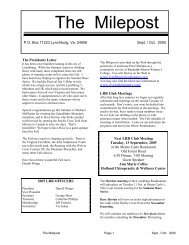Standard PDF - Randolph College
Standard PDF - Randolph College
Standard PDF - Randolph College
You also want an ePaper? Increase the reach of your titles
YUMPU automatically turns print PDFs into web optimized ePapers that Google loves.
New English Curriculum Provides<br />
Innovative Approach to Learning<br />
In the new program, students<br />
study English literature within<br />
the context of genres instead<br />
of the traditional historical<br />
approach…<br />
Professor of English Dan Stiffler<br />
Survey courses, long a staple<br />
of undergraduate English<br />
programs, offer students a sampling<br />
of authors and works within an<br />
historical time period. For English<br />
majors, they form the foundation<br />
of the work necessary to acquire a<br />
degree.<br />
<strong>Randolph</strong> <strong>College</strong> is about to<br />
rewrite the book on learning about<br />
English literature.<br />
The changes were sparked by<br />
the English department faculty<br />
recognizing three trends: more<br />
students were expressing interest<br />
in the creative writing emphasis;<br />
creative writing students were<br />
taking historical survey courses,<br />
which did not serve their needs<br />
well; and the students in the<br />
creative writing and literature<br />
emphasis areas were not learning<br />
together—even though they were<br />
all English majors.<br />
“Our students did not work<br />
together until their senior seminar,”<br />
said Dan Stiffler, a professor of<br />
English. “We decided to integrate<br />
the learning experience for creative<br />
writing and literature students.”<br />
After a six-year process of thought<br />
and planning, and plenty of<br />
input from students already in<br />
the program, an innovative new<br />
English program rolled out at the<br />
beginning of this semester.<br />
In the new program, students<br />
study English literature within the<br />
context of genres instead of the<br />
traditional historical approach<br />
that is often presented in<br />
anthologies published by Norton,<br />
for example.<br />
To ensure that all English<br />
majors have an understanding of<br />
the creative process—whether they<br />
intend to write or analyze English<br />
literature—students are required to<br />
complete Introduction to Creative<br />
Writing. They also complete three<br />
core courses dealing with poetry,<br />
prose, fiction, and drama. The core<br />
courses are designed to provide<br />
a basic understanding of English<br />
literature, reveal the structure<br />
of literary expression, and help<br />
students develop skills in critical<br />
analysis and creative expression.<br />
Students select their advanced<br />
courses in three categories:<br />
genre or mode; period, topic, or<br />
movement; and author(s). Within<br />
the categories, they will find, for<br />
example, existing courses, such as<br />
Magical Realism, a world literature<br />
course; courses that have been<br />
refocused, such as The Concord<br />
Circle, about the discourses of<br />
Romanticism; and new courses,<br />
such as Inspired by the Sea, about<br />
the sea not only as a setting but also<br />
as a transnational theory.<br />
The changes in the English<br />
program have spun off four new<br />
minors: drama, fiction, literature,<br />
and poetry. The minors provide<br />
English majors, and all <strong>Randolph</strong><br />
students, with an opportunity to<br />
delve into specific genres in which<br />
they are interested.<br />
“We’re excited about this fresh<br />
approach that offers our students<br />
a variety of tantalizing ways to<br />
engage literature and learn from it,”<br />
said Heidi M. Kunz, chair of the<br />
English department.<br />
4


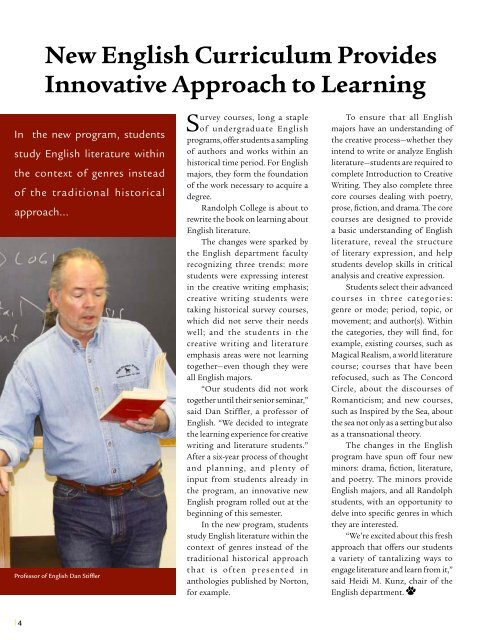
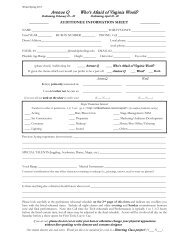
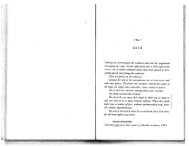
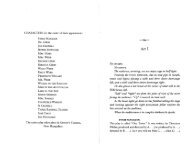
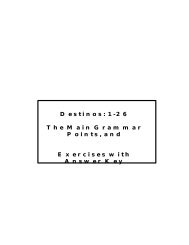
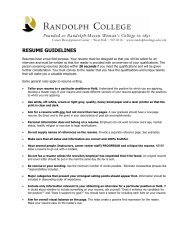
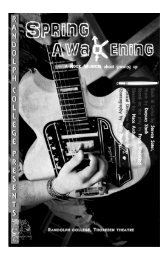
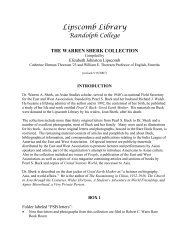
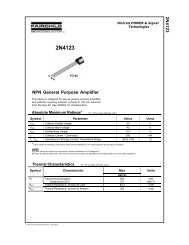
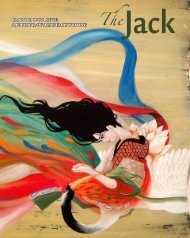
![Cast & Crew List [Program Copy pdf] - Randolph College](https://img.yumpu.com/38268916/1/190x123/cast-crew-list-program-copy-pdf-randolph-college.jpg?quality=85)
